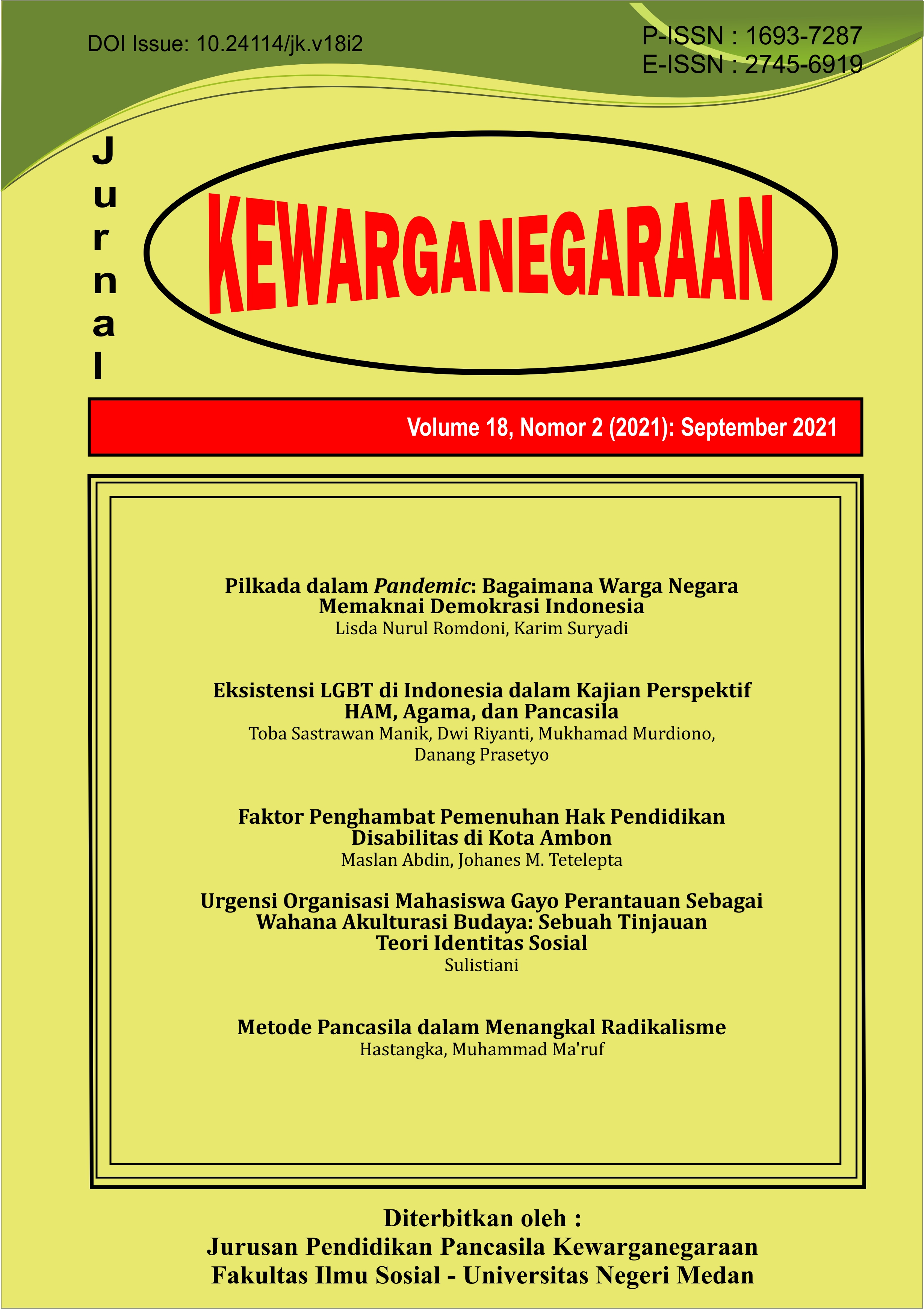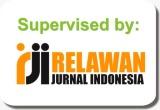Eksistensi LGBT Di Indonesia dalam Kajian Perspektif HAM, Agama, dan Pancasila
DOI:
https://doi.org/10.24114/jk.v18i2.23639Keywords:
LGBT, Pancasila, Islam, CitizenshipAbstract
AbstractGay, Bisexual, and Transgender (LGBT) in Indonesia from the perspective of human rights, Islam, and Pancasila. Research is qualitative using the method of literature study (library research). LGBT based on a religious point of view, especially Islam and Pancasila are declared forbidden and contrary culture. But, the state is in ambiguity in determining policy. The State of Indonesia faces a dilemma between Pancasila and Islam with the consistency and spirit of human rights enforcement in Indonesia since the Reformation Era. This manifestation of ambiguity appears to be the lack of clear regulation of LGBT. This gives rise to discriminatory attitudes towards LGBT people both psychologically, physically socially, culturally, and economically. This study recommends that the state should take a bold stance in determining the point of view of LGBT. LGBT citizens should still be treated equally. The absence of regulation against LGBT is a manifestation of discrimination by the state. The state should give its perspective on LGBT in Indonesia. -------------AbstrakTujuan dari artikel ini ialah untuk mengkaji tentang eksistensi Lesbian, Gay, Biseksual, dan Transgender (LGBT) di Indonesia dari perspektif hak asasi manusia, Islam, dan Pancasila. Penelitian bersifat kualitatif dengan menggunakan metode kajian literatur (library research). LGBT jika dipandang dari sudut agama khususnya Islam dan Pancasila jelas dinyatakan terlarang dan bertentangan dengan budaya Indonesia. Tapi, negara dalam keambiguan dalam menentukan kebijakan. Negara Indonesia menghadapi dilema antara Pancasila dan Islam dengan konsistensi dan semangat penegakan HAM di Indonesia sejak Era Reformasi. Manifestasi keambiguan ini tampak pada ketiadaan regulasi yang jelas terhadap LGBT. Hal ini menimbulkan sikap diskrimnasi terhadap kalangan LGBT baik secara psikis, fisik secara sosial, budaya, dan ekonomi. Rekomendasi dari kajian ini ialah negara harus berani mengambil sikap dalam menentukan sudut pandang terhadap LGBT. LGBT sebagai warga negara harus tetap diperlakukan sama. Ketiadaan regulasi terhadap kalangan LGBT merupakan manifestasi diskriminasi oleh negara. Negara harus memberikan sudut pandangnya sendiri terhadap LGBT di IndonesiaReferences
Artina, D. (2016). Kedudukan LGBT dalam Hukum Negara Republik Indonesia ditinjau dari perspektif Pancasila. Seminar Nasional Hukum Universitas Negeri Semarang, 2(1), 195“206.
Blackwood, E. (2010). Falling into the lesbi world: Desire and Difference in Indonesia. In Falling into the Lesbi World: Desire and Difference in Indonesia.
Boellstorff, T. (2004). The emergence of political homophobia in Indonesia: Masculinity and national belonging. Ethnos, 69(4), 465“486. https://doi.org/10.1080/0014184042000302308
Gina, G. A. & A. (2016). Queering Indonesia : When the State is Absent :A Study of LGBT Community in Jakarta. Indonesian Feminist Journal, 4(1), 4“14.
Hefner, R. W. (2011). Civil Islam: Muslims and democratization in Indonesia. In Civil Islam: Muslims and Democratization in Indonesia. https://doi.org/10.2307/3557788
Isin, E. F., & Wood, P. K. (1999). Citizenship and Identity. Sage Publications.
Kominfo. (2020). No Title. https://kominfo.go.id/content/detail/6856/pemerintah-konsisten-jalankan-kostitusi-tidak-melayani-pernikahan-sejenis/0/rilis_media_gpr
Lister, R. (2002). Sexual Citizenship. In E. F. Isin & B. S. Turner (Eds.), Handbook of Citizenship Studies. Sage Publications.
Nash, K. (2010). Contemporary Political Sociology: Globalization, Politics, and Power (Second Edition). Wiley-Blackwell.
Nurgiansah, T. H. (2020). Fenomena Prostitusi Online di Kota Yogyakarta dalam Perspektif Nilai Kemanusiaan Yang Adil dan Beradab. Jurnal Kewarganegaraan, 17(1), 27. https://doi.org/10.24114/jk.v17i1.14208
Offord, B., & Cantrell, L. (2000). Homosexual rights as human rights in Indonesia and Australia. Journal of Homosexuality, 40(3“4), 233“252. https://doi.org/10.1300/J082v40n03_12
Papilaya, J. O., & Ludji, I. (2016). Lesbian , Gay , Biseksual , Transgender (LGBT) dan Keadilan Sosial. PAx Humara, 3, 25“34.
Platt, M., Davies, S. G., & Bennett, L. R. (2018). Contestations of Gender, Sexuality and Morality in Contemporary Indonesia. Asian Studies Review, 42(1), 1“15. https://doi.org/10.1080/10357823.2017.1409698
Riadi, M. E. (2010). Kedudukan Fatwa Ditinjau Dari Hukum Islam Dan Hukum Positif. Ulumuddin, VI, 468“477.
Samsu, H. (2018). Kedudukan lesbian, gay, biseksual, dan transgender (lgbt) di indonesia ditinjau dari perspektif hak asasi manusia. Lex Et Societatis, VI(6), 13“20. https://doi.org/10.1017/CBO9781107415324.004
Santoso, M. B. (2016). Lgbt Dalam Perspektif Hak Asasi Manusia. Share : Social Work Journal, 6(2), 220. https://doi.org/10.24198/share.v6i2.13206
Saroh, Y., & Relawati, M. (2017). Indonesian Youth™S Perespective Towards Lgbt. Humanus, 16(1), 71. https://doi.org/10.24036/jh.v16i1.7323
Sofyarto, K. (2018). Abu-abu regulasi lgbt di indonesia. Selisik, 4(6), 84“94.
Sujana, I. N., Setyawati, K. A., & Ujanti, N. M. P. (2018). the Existence of the Lesbian, Gay, Bisexual and Transgender (Lgbt) Community in the Perspective of a State Based on Pancasila. Mimbar Hukum - Fakultas Hukum Universitas Gadjah Mada, 30(1), 126. https://doi.org/10.22146/jmh.28655
Taylor, Y. (2011). Lesbian and Gay Parent™s Sexual Citizenship: Recognition, Belonging and (Re)classification. In Janice McLaughlin, P. Phillimore, & Diane Richardson (Eds.), Contesting Recognition: Culture, Identity and Citizenship. Palgrave Macmillan. https://doi.org/10.1017/CBO9781107415324.004
UNDP. (2014). Being Lgbt in Asia : Indonesia Country Report.
Wibowo, A. (2015). Tinjauan Teoritis Terhadap Wacana Kriminalisasi LGBT. Cakrawala Hukum, X, 120“151.
Yansyah, R., & Rahayu, R. (2018). Globalisasi Lesbian, Gay, Biseksual, Dan Transgender (Lgbt): Perspektif Ham Dan Agama Dalam Lingkup Hukum Di Indonesia. Law Reform, 14(1), 132. https://doi.org/10.14710/lr.v14i1.20242.
Downloads
Published
Issue
Section
License
Copyright (c) 2021 Toba Sastrawan Manik, Dwi Riyanti, Mukhamad Murdiono, Danang Prasetyo

This work is licensed under a Creative Commons Attribution-ShareAlike 4.0 International License.
Authors published with the Jurnal Kewarganegaraan agree to the following terms:
- Authors retain copyright and grant the journal the right of first publication with the work simultaneously licensed under a Creative Commons Attribution License (CC BY-SA 4.0) that allows others to share the work with an acknowledgment of the work's authorship and initial publication in this journal.
- Authors are able to enter into separate, additional contractual arrangements for the non-exclusive distribution of the journal's published version of the work (e.g., post it to an institutional repository or publish it in a book), with an acknowledgment of its initial publication in this journal.
- Authors are permitted and encouraged to post their work online (e.g., in institutional repositories or on their website) prior to and during the submission process, as it can lead to productive exchanges, as well as earlier and greater citation of published work. (See The Effect of Open Access)
Licence

Jurnal Kewarganegaraan is licensed under a Creative Commons Attribution-ShareAlike 4.0 International License.








